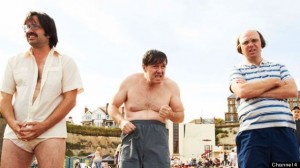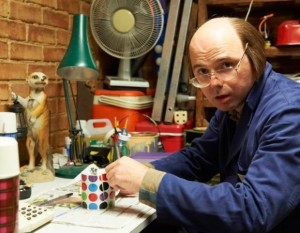Halfway through the second episode of Derek, the newest venture in original programming from Netflix, the titular character is asked if he has autism. It’s the first and last time the elephant in the proverbial room is addressed. Derek, as played by writer-director Ricky Gervais, certainly seems to fall somewhere on the spectrum: he’s “simple-minded,” (the show’s words, not ours,) socially inept, and childishly naïve. He’s also got a variety of physical tics: a lurching walk, a quivering overbite, and a reluctance toward eye contact. None of these traits qualify a diagnosis, especially not from a television audience. But they are prominent enough for even the most casual viewer to presume that Derek probably has a disability.
Not so, according to Mr. Gervais. He maintains that Derek is simply “different.” On his website, he writes:
“Is Derek disabled? The short answer is, ‘no.’ The longer answer is, ‘no, but what difference would it make if he was?’”
This is the same answer Derek gives in Episode 2 when it’s suggested he get tested for autism. He’s never so much as heard this suggestion before, either. “If I am tistic,” he says (“Autistic,” corrects the questioner. “Yeah. Tistic. That’s what I said.”), “will I die? Would it change me in any way? Would I be the same person? …Don’t worry about it, then.”
This is a lovely thought, but unfortunately for Mr. Gervais, it doesn’t quite hold water. Does it matter for Derek, the character, whether does or does not have autism? No. It does, however, matter for Derek, the sitcom.
But let’s take a step back. Derek is a mockumentary-style sitcom that follows the day-to-day of Derek Noakes, a perpetually happy 50-year-old care worker in a retirement home. Like most mockumentary sitcoms, including Gervais’ iconic The Office, it’s unclear exactly who is doing the filming or why. Derek thinks it might be the producers of “Secret Millionaire.”
The other characters of Derek include kindly home manager Hannah (a wonderful Kerry Godliman), crabby caretaker Dougie (Karl Pilkington), and odious hanger-on Kev (David Earl), along with a whole houseful of senior citizens. There’s not much in the way of plot; the characters simply exist within their world. The drama is never heightened beyond an occasional quiet worry over budget cuts. This is a far cry from the outlandish cringe-comedy that characterized The Office. Instead, Derek remains soft-spoken, and treats its characters with unabashed tenderness.
It’s this tenderness that gives Derek both its greatest strengths and deepest flaws. On the one hand, Derek exudes a spirit of sincere good-heartedness that is rarely found on today’s networks. The show even has an official theme: kindness is magic. “It’s more important to be kind than clever or good looking. I’m not clever or good looking, but I am kind.” says Derek. It’s a beautiful message and one that’s truly refreshing, especially coming from a comedy.
If only Derek were a little more subtle about it. Instead, Ricky Gervais insists on explaining it to us at least twice an episode. You’d be hard-pressed to find a talking head segment where the character isn’t expounding on Derek’s impossible kindness. Derek is the heart of the show, and Derek isn’t going to let you forget it for a second. The effect is a bit maddening: instead of allowing the audience time to grow to love our protagonist, we’re just told us over and over again how wonderful he is. The insistent bombardment of this information betrays the insecurity of a director who desperately wants his audience to think the right way.
Compare this approach to, say, a show like Parks and Recreation, which owes much of its success to Gervais’ legacy, and is one of the best contemporary examples of a comedy rooted in and dependent on emotional investment. Although P and R’s pilot season was a bit of a struggle, its slow-burning presentation of each of the characters allowed the audience to discover what they loved about each one in turn. Especially because, in the end, it’s not up to the director or the writers or even the actors to decide which characters receive the audience’s devotion. Television is the medium of the viewer. The producers can take every step possible to get us watching, but in the end, it’s up to us whether or not we want to accept these characters into our lives.
Ricky Gervais seems to have forgotten this, and his refusal to relinquish control only serves to push his audience further away. And it’s this approach that has the opposite effect of Gervais’ intentions, as it leads us right back to that niggling little question: does Derek have a disability? Because all this telling-not-showing of Derek’s saintliness certainly feels like overcompensation. If Derek continues for another few seasons (and I suspect it will), Gervais will have to make a choice between normalizing some of Derek’s behavior, or ceding that Derek is not, in fact, perfectly normal. Either show could work (although I’d like to see the riskier latter.) Derek as it currently exists is too frustrating to continue for long.
In fact, perhaps it’d be a good idea to remove Mr. Gervais from the driver’s seat altogether. Gervais’ heavy-handed directing borders on embarrassing at times, like when Coldplay’s “Fix You” plays unironically at emotional moments (what is this, 2005?) or when the action is regularly interrupted for long montages of old people footage. There’s room for comedy in Derek, but Gervais often suffocates it out.
The show’s highlights come from the supporting players. Kerry Godliman is beautifully natural as Hannah, who is as soothing to the audience as she is to those around her, and Karl Pilkington is a secret weapon as Dougie, whose sour pragmatism and impossibly bad hair easily give him the best scenes of the show (“I know my hair is stupid. The other day someone shouted, ‘There’s an egg with sideburns!’”). David Earl doesn’t fare as well with Kev, whose sex-and-farts brand of humor grows old halfway through the pilot.
Derek is still a long way from reaching its full potential, or even being definitively good. It’s an exuberant, mesmerizing mess of television, as often frustrating as it is enlightening. It might make you laugh; it’ll certainly make you cry. It will leave you scratching your head for days. But there’s never been anything quite like Derek on television before, and that alone makes it worth watching.




